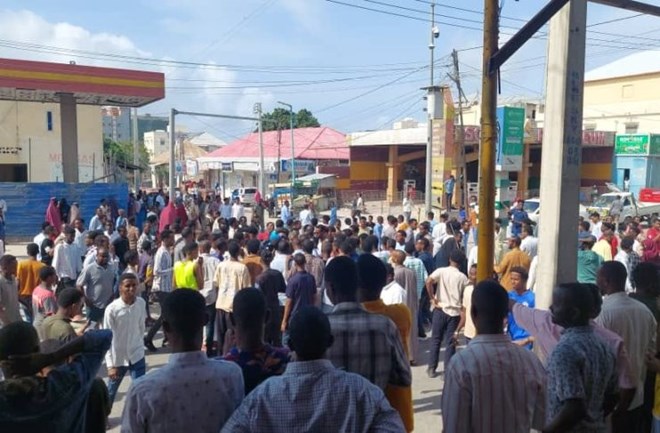
Tuesday August 20, 2024
By Mohammed Omar Ahmed and Mohamed Sheikh Nor

Somali police fired live rounds to disperse protesters in Mogadishu's Warta Nabada district, where business owners and residents marched against a newly imposed 5% VAT. Bakara Market remains closed for a second consecutive day. Two journalists were detained, and their equipment was confiscated. (Credit: Abdi Guled)
(Bloomberg) -- Commerce in Somalia was interrupted for a second day on Monday as traders protested the introduction of a sales tax, a key reform for the Horn of Africa nation’s government that secured a $100 million lifeline from the International Monetary Fund.
The 5% value-added tax, which took effect on Aug. 18, is being levied on most goods and services, including banking. It comes as President Hassan Sheikh Mohamud’s administration tries to rebuild an economy decimated by more than three decades of civil war and opposition from al-Shabaab, a terrorist group linked to al-Qaeda.
The protests have led to the shutdown of major stores in Bakara, the largest market in the capital, Mogadishu. Somalia’s fledgling government relies on taxes from the city’s business community to fund its spending priorities as it has no means of collecting levies from other regions. It also depends on African Union troops to maintain peace in areas it controls outside the capital.
“The strike will continue until the government addresses our concerns by either reducing or completely withdrawing the tax,” said Mohamed Hassan, a store owner in the Bakara market.
Somalia secured an extended credit facility from the IMF in December. It seeks to develop a new income tax law and boost revenue collection under the program.
The war-torn nation also reached an agreement to cancel $4.5 billion in debt with international lenders late last year. Under the deal, its external obligations were forecast to fall below 6% of gross domestic product by the year of 2023, from 42% previously, according to the IMF and World Bank.